How to Build Mental Health Intake Forms?
How to Build Mental Health Intake Forms?
How to Build Mental Health Intake Forms?
Mental health intake forms are not like patient intake forms. Mental health intake forms deal with far more sensitive data and have specific design methods.
Mental health intake forms are not like patient intake forms. Mental health intake forms deal with far more sensitive data and have specific design methods.
Mental health intake forms are not like patient intake forms. Mental health intake forms deal with far more sensitive data and have specific design methods.
Designing mental health intake forms is a delicate pursuit. Unlike standard medical forms, these require a sensitive approach to ensure patient privacy and comfort while gathering essential information. This blog aims to help healthcare professionals navigate these complexities with empathy and effectiveness.
Does It Differ From a Patient Intake Form? Yes
Mental health intake forms differ a lot from medical forms. The medical forms, especially medical history forms, focus on physical symptoms like allergies, genetic conditions, hereditary diseases, and lifestyle choices like smoking or drinking.

On the other hand, mental health intake forms delve into the subjective world of emotions, thoughts, and behaviors. Mental health forms are not just to know about past incidents but to understand current struggles and coping mechanisms.
With data from the past and present, a trained mental health practitioner (therapist or psychiatrist, or counselor) can create a treatment plan.
Is Mental Health Part of HIPAA?
Any information under the Protected Health Information category or PHI must comply with HIPAA. PHI is any information in a patient’s medical record that can be used to identify them and when shared with an organization or an individual.
Mental health also comes under HIPAA compliance rules since insurance providers cover mental health, and information is shared with the insurance companies in medical release forms. This means that as a mental healthcare provider, you must have HIPAA compliance to gain patients’ trust.
3 Types of Mental Health Intake Forms
Different mental health services require different forms. Here’s a quick look at three common types:
Counseling Intake Form: This type of mental health intake form builds the initial connection between the client and the counselor. It collects biographical data, current concerns, mental health history, and support systems that the patient might already have (therapy, journalling, exercise, etc.). Questions may cover stress levels, relationship with family and partner, and personal habits related to sleep, exercise, and food to paint a full picture of the client’s situation.
Psychiatric Intake Form: Focused more on diagnosis and medication, this mental health intake form includes detailed mental health and family history, substance use (alcohol, drugs, tobacco, addictive medicines), and current symptoms that could be manifesting physically (sweaty hands, shaking, chest pain, dry throat). Its structured nature helps psychiatrists understand the patient's clinical needs.
Therapy Intake Form: Similar to counseling forms but often more in-depth. These mental health intake forms explore past experiences, trauma, attachment styles, and family dynamics. Knowing this, a mental health care provider can assign the patient to relevant therapists who can create personalized treatment plans.
Mental Health Intake Form: The Must Haves
To craft impactful mental health intake forms, consider the following essentials for higher conversion rates:
Privacy and Safety: Patient confidentiality is paramount in the mental health domain. Use clear language, offer opt-out options for sensitive questions, and provide crisis support resources as a reward once the patient has filled out the form.
Tailor to the Purpose: Focus on relevant questions that inform clinical decisions or treatment plans, avoiding unnecessary details. If knowing about location is unnecessary, like in a virtual therapy booking session, do not ask for it.
Empathy and Openness: Ensure the language is inclusive and non-judgmental. Create a welcoming space for patients to share their experiences. For instance, instead of asking, “What's is your problem?” ask, “How are you feeling about your mental health, and what’s something you want to find a solution for?”.
Be Transparent: Explain how the information will be used and stored and, whenever shared, what part will be shared and with whom. Reassure patients about their data privacy rights and take a HIPAA-compliant medical consent form during patient intake.
Ensure Accessibility: This is more than just making a keyboard-friendly form, which is a part of accessibility but not the only part. Accessibility allows patients to share information via text and other mediums - voice notes, images, or file uploads. This will not inhibit someone with the “right information” to drop-off. Let’s say you ask a patient for their current psychiatric medicines, and they want to upload a photo. Not having the upload option will lead to a drop-off.
Action Items for Mental Health Intake Forms
Creating effective mental health intake forms is more than data collection; it's about having a safe virtual experience for those seeking help. To sum it up,
Prioritize patient mental health data privacy as per HIPAA guidelines
Educate the patient on the type of form: counseling, therapy, or psychiatric
Maintain transparency around data use and storage.
Offer accessible input formats which are multi-modal
Use friendly language and avoid trigger words
Following these guidelines, building mental health intake forms will not be a difficult task. There surely are other things that can be like A/B testing questions, using an intuitive form-building platform, and using AI-powered analytics. We’ve covered them in this post and have these features on WorkHack forms that you can check out here.
Designing mental health intake forms is a delicate pursuit. Unlike standard medical forms, these require a sensitive approach to ensure patient privacy and comfort while gathering essential information. This blog aims to help healthcare professionals navigate these complexities with empathy and effectiveness.
Does It Differ From a Patient Intake Form? Yes
Mental health intake forms differ a lot from medical forms. The medical forms, especially medical history forms, focus on physical symptoms like allergies, genetic conditions, hereditary diseases, and lifestyle choices like smoking or drinking.

On the other hand, mental health intake forms delve into the subjective world of emotions, thoughts, and behaviors. Mental health forms are not just to know about past incidents but to understand current struggles and coping mechanisms.
With data from the past and present, a trained mental health practitioner (therapist or psychiatrist, or counselor) can create a treatment plan.
Is Mental Health Part of HIPAA?
Any information under the Protected Health Information category or PHI must comply with HIPAA. PHI is any information in a patient’s medical record that can be used to identify them and when shared with an organization or an individual.
Mental health also comes under HIPAA compliance rules since insurance providers cover mental health, and information is shared with the insurance companies in medical release forms. This means that as a mental healthcare provider, you must have HIPAA compliance to gain patients’ trust.
3 Types of Mental Health Intake Forms
Different mental health services require different forms. Here’s a quick look at three common types:
Counseling Intake Form: This type of mental health intake form builds the initial connection between the client and the counselor. It collects biographical data, current concerns, mental health history, and support systems that the patient might already have (therapy, journalling, exercise, etc.). Questions may cover stress levels, relationship with family and partner, and personal habits related to sleep, exercise, and food to paint a full picture of the client’s situation.
Psychiatric Intake Form: Focused more on diagnosis and medication, this mental health intake form includes detailed mental health and family history, substance use (alcohol, drugs, tobacco, addictive medicines), and current symptoms that could be manifesting physically (sweaty hands, shaking, chest pain, dry throat). Its structured nature helps psychiatrists understand the patient's clinical needs.
Therapy Intake Form: Similar to counseling forms but often more in-depth. These mental health intake forms explore past experiences, trauma, attachment styles, and family dynamics. Knowing this, a mental health care provider can assign the patient to relevant therapists who can create personalized treatment plans.
Mental Health Intake Form: The Must Haves
To craft impactful mental health intake forms, consider the following essentials for higher conversion rates:
Privacy and Safety: Patient confidentiality is paramount in the mental health domain. Use clear language, offer opt-out options for sensitive questions, and provide crisis support resources as a reward once the patient has filled out the form.
Tailor to the Purpose: Focus on relevant questions that inform clinical decisions or treatment plans, avoiding unnecessary details. If knowing about location is unnecessary, like in a virtual therapy booking session, do not ask for it.
Empathy and Openness: Ensure the language is inclusive and non-judgmental. Create a welcoming space for patients to share their experiences. For instance, instead of asking, “What's is your problem?” ask, “How are you feeling about your mental health, and what’s something you want to find a solution for?”.
Be Transparent: Explain how the information will be used and stored and, whenever shared, what part will be shared and with whom. Reassure patients about their data privacy rights and take a HIPAA-compliant medical consent form during patient intake.
Ensure Accessibility: This is more than just making a keyboard-friendly form, which is a part of accessibility but not the only part. Accessibility allows patients to share information via text and other mediums - voice notes, images, or file uploads. This will not inhibit someone with the “right information” to drop-off. Let’s say you ask a patient for their current psychiatric medicines, and they want to upload a photo. Not having the upload option will lead to a drop-off.
Action Items for Mental Health Intake Forms
Creating effective mental health intake forms is more than data collection; it's about having a safe virtual experience for those seeking help. To sum it up,
Prioritize patient mental health data privacy as per HIPAA guidelines
Educate the patient on the type of form: counseling, therapy, or psychiatric
Maintain transparency around data use and storage.
Offer accessible input formats which are multi-modal
Use friendly language and avoid trigger words
Following these guidelines, building mental health intake forms will not be a difficult task. There surely are other things that can be like A/B testing questions, using an intuitive form-building platform, and using AI-powered analytics. We’ve covered them in this post and have these features on WorkHack forms that you can check out here.
Designing mental health intake forms is a delicate pursuit. Unlike standard medical forms, these require a sensitive approach to ensure patient privacy and comfort while gathering essential information. This blog aims to help healthcare professionals navigate these complexities with empathy and effectiveness.
Does It Differ From a Patient Intake Form? Yes
Mental health intake forms differ a lot from medical forms. The medical forms, especially medical history forms, focus on physical symptoms like allergies, genetic conditions, hereditary diseases, and lifestyle choices like smoking or drinking.

On the other hand, mental health intake forms delve into the subjective world of emotions, thoughts, and behaviors. Mental health forms are not just to know about past incidents but to understand current struggles and coping mechanisms.
With data from the past and present, a trained mental health practitioner (therapist or psychiatrist, or counselor) can create a treatment plan.
Is Mental Health Part of HIPAA?
Any information under the Protected Health Information category or PHI must comply with HIPAA. PHI is any information in a patient’s medical record that can be used to identify them and when shared with an organization or an individual.
Mental health also comes under HIPAA compliance rules since insurance providers cover mental health, and information is shared with the insurance companies in medical release forms. This means that as a mental healthcare provider, you must have HIPAA compliance to gain patients’ trust.
3 Types of Mental Health Intake Forms
Different mental health services require different forms. Here’s a quick look at three common types:
Counseling Intake Form: This type of mental health intake form builds the initial connection between the client and the counselor. It collects biographical data, current concerns, mental health history, and support systems that the patient might already have (therapy, journalling, exercise, etc.). Questions may cover stress levels, relationship with family and partner, and personal habits related to sleep, exercise, and food to paint a full picture of the client’s situation.
Psychiatric Intake Form: Focused more on diagnosis and medication, this mental health intake form includes detailed mental health and family history, substance use (alcohol, drugs, tobacco, addictive medicines), and current symptoms that could be manifesting physically (sweaty hands, shaking, chest pain, dry throat). Its structured nature helps psychiatrists understand the patient's clinical needs.
Therapy Intake Form: Similar to counseling forms but often more in-depth. These mental health intake forms explore past experiences, trauma, attachment styles, and family dynamics. Knowing this, a mental health care provider can assign the patient to relevant therapists who can create personalized treatment plans.
Mental Health Intake Form: The Must Haves
To craft impactful mental health intake forms, consider the following essentials for higher conversion rates:
Privacy and Safety: Patient confidentiality is paramount in the mental health domain. Use clear language, offer opt-out options for sensitive questions, and provide crisis support resources as a reward once the patient has filled out the form.
Tailor to the Purpose: Focus on relevant questions that inform clinical decisions or treatment plans, avoiding unnecessary details. If knowing about location is unnecessary, like in a virtual therapy booking session, do not ask for it.
Empathy and Openness: Ensure the language is inclusive and non-judgmental. Create a welcoming space for patients to share their experiences. For instance, instead of asking, “What's is your problem?” ask, “How are you feeling about your mental health, and what’s something you want to find a solution for?”.
Be Transparent: Explain how the information will be used and stored and, whenever shared, what part will be shared and with whom. Reassure patients about their data privacy rights and take a HIPAA-compliant medical consent form during patient intake.
Ensure Accessibility: This is more than just making a keyboard-friendly form, which is a part of accessibility but not the only part. Accessibility allows patients to share information via text and other mediums - voice notes, images, or file uploads. This will not inhibit someone with the “right information” to drop-off. Let’s say you ask a patient for their current psychiatric medicines, and they want to upload a photo. Not having the upload option will lead to a drop-off.
Action Items for Mental Health Intake Forms
Creating effective mental health intake forms is more than data collection; it's about having a safe virtual experience for those seeking help. To sum it up,
Prioritize patient mental health data privacy as per HIPAA guidelines
Educate the patient on the type of form: counseling, therapy, or psychiatric
Maintain transparency around data use and storage.
Offer accessible input formats which are multi-modal
Use friendly language and avoid trigger words
Following these guidelines, building mental health intake forms will not be a difficult task. There surely are other things that can be like A/B testing questions, using an intuitive form-building platform, and using AI-powered analytics. We’ve covered them in this post and have these features on WorkHack forms that you can check out here.
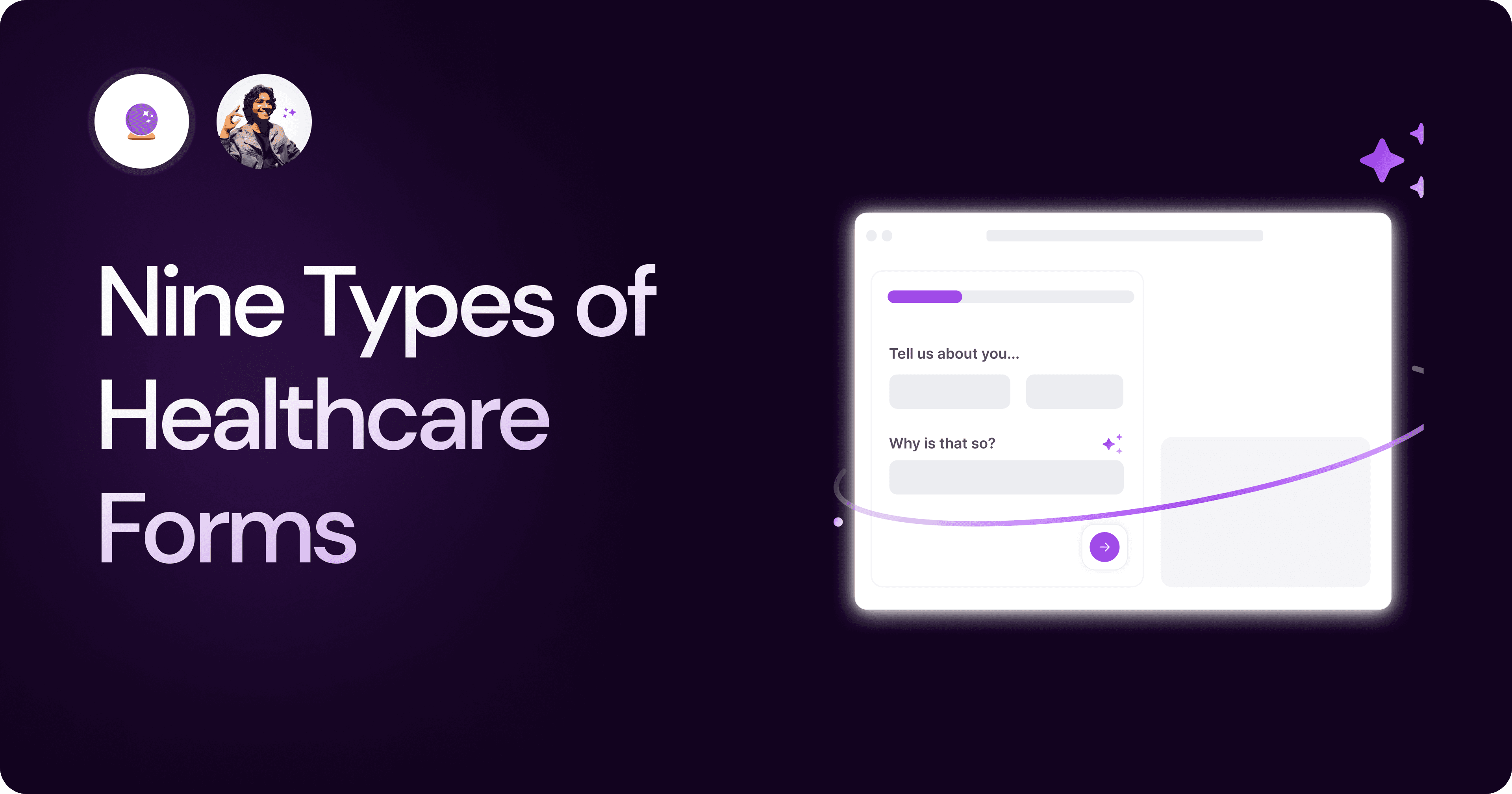
Nine Types of Healthcare and Medical Forms.
Medical forms are a must-have for any healthcare business or practitioner. Learn about the different kinds of medical and healthcare forms.
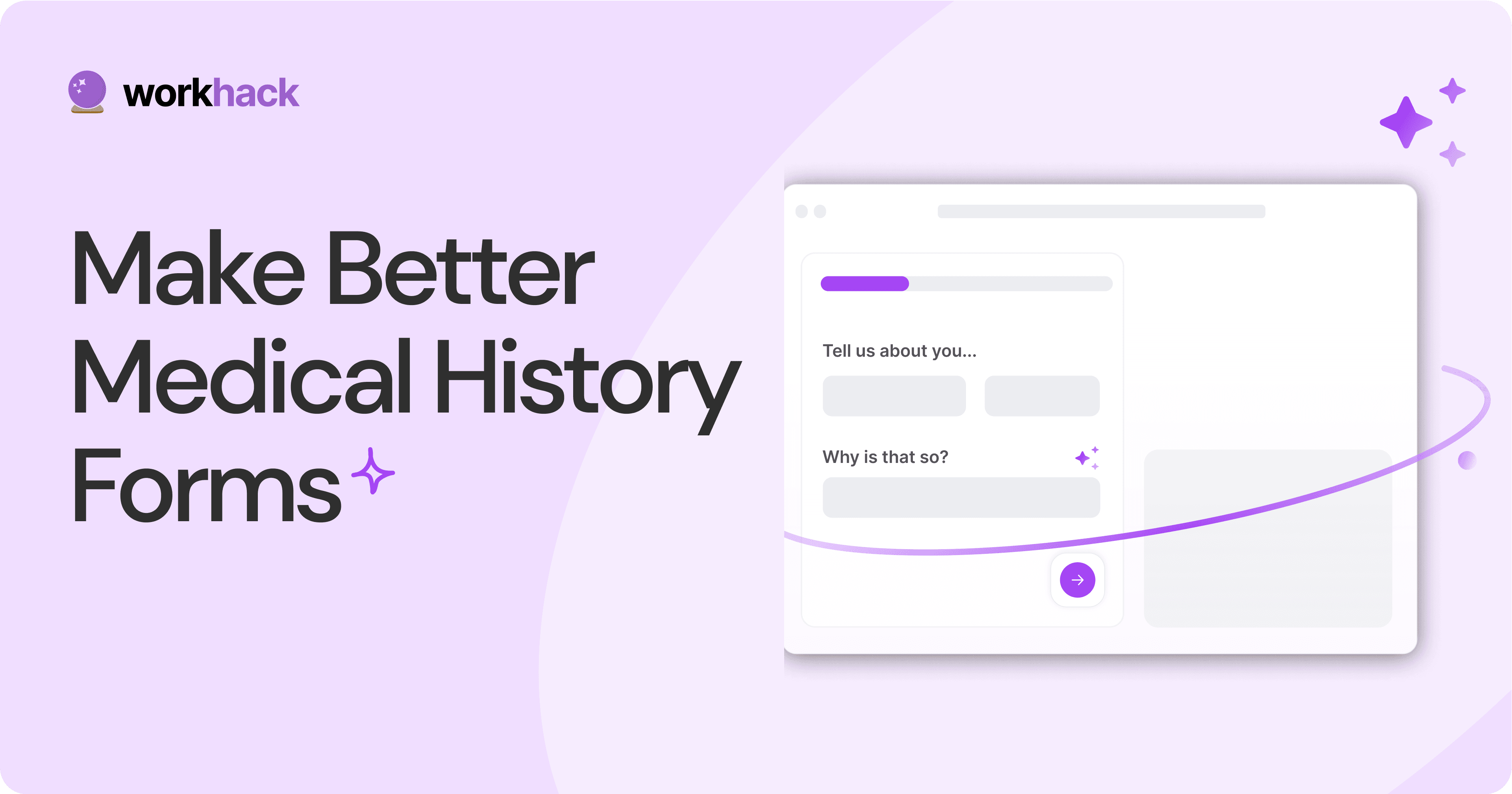
4 Tips for Better Medical History Forms.
Medical history forms are central to patient care, onboarding, and medical administration records. Learn how to make them easier to fill.
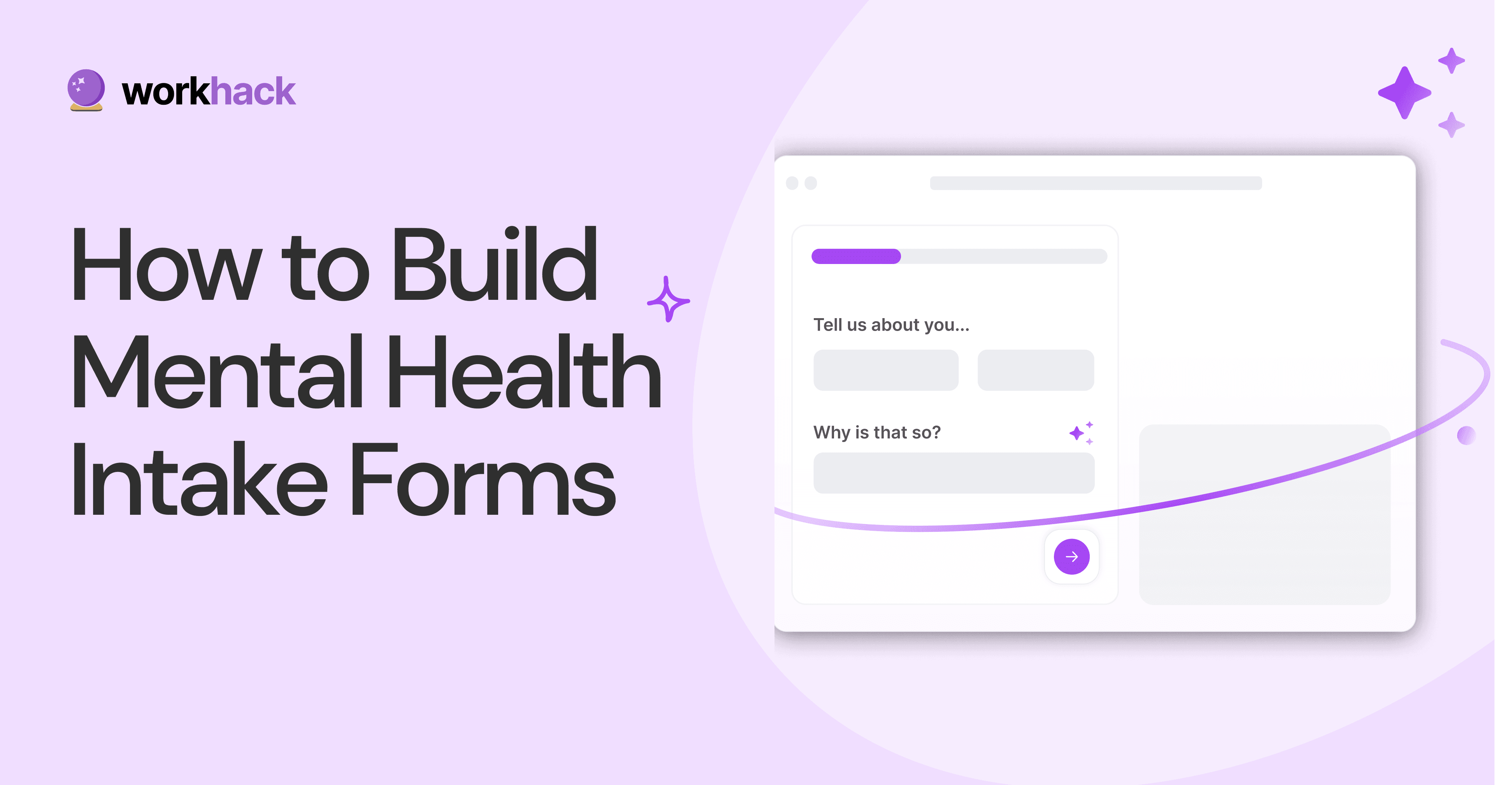
How to Build Mental Health Intake Forms?
Mental health intake forms are not like patient intake forms. Mental health intake forms deal with far more sensitive data and have specific design methods.
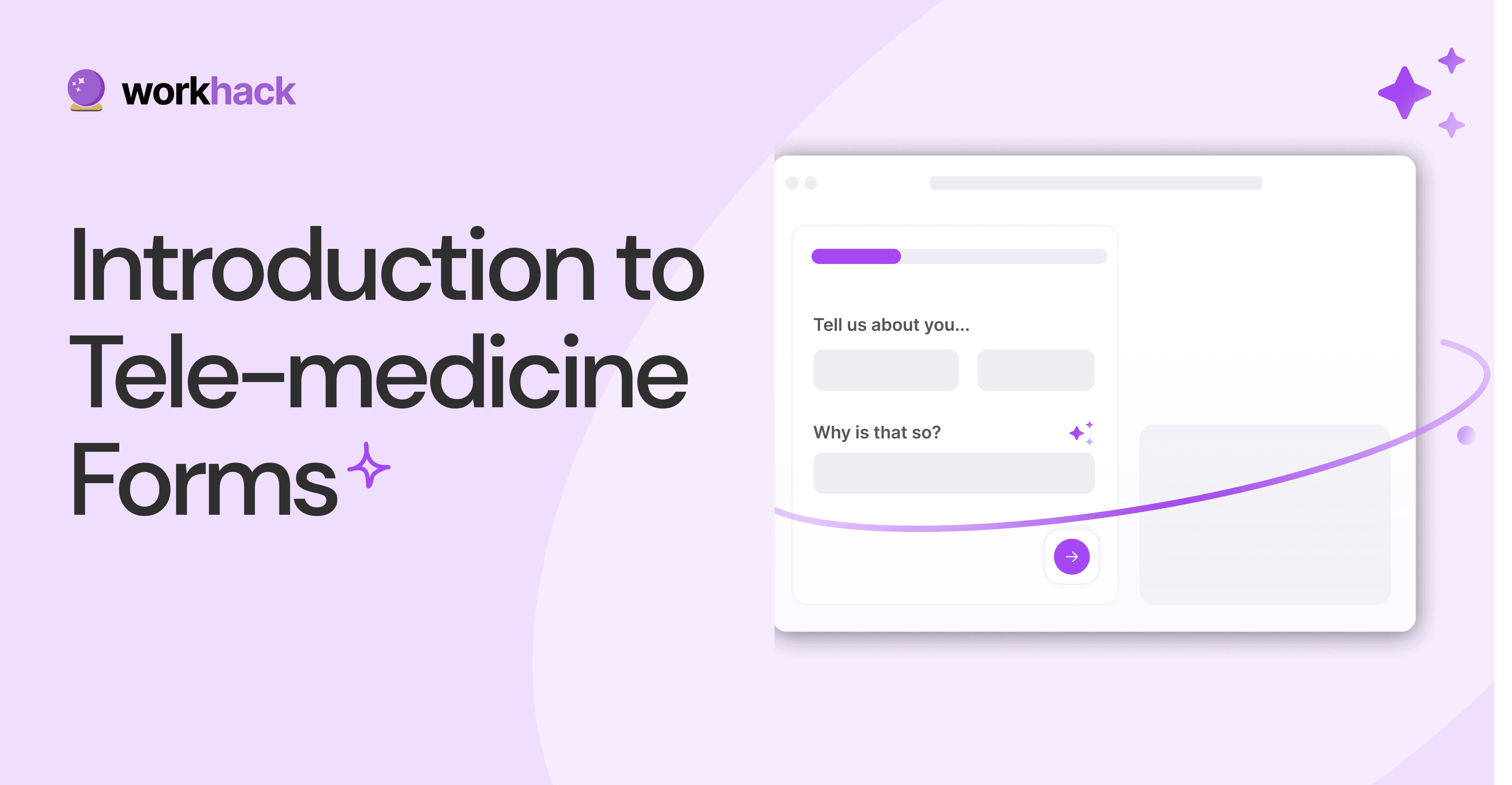
What, Why and How of Telemedicine Forms.
Telemedicine is on the rise and with different form builders out there, which one best suits your needs as a healthcare services provider?
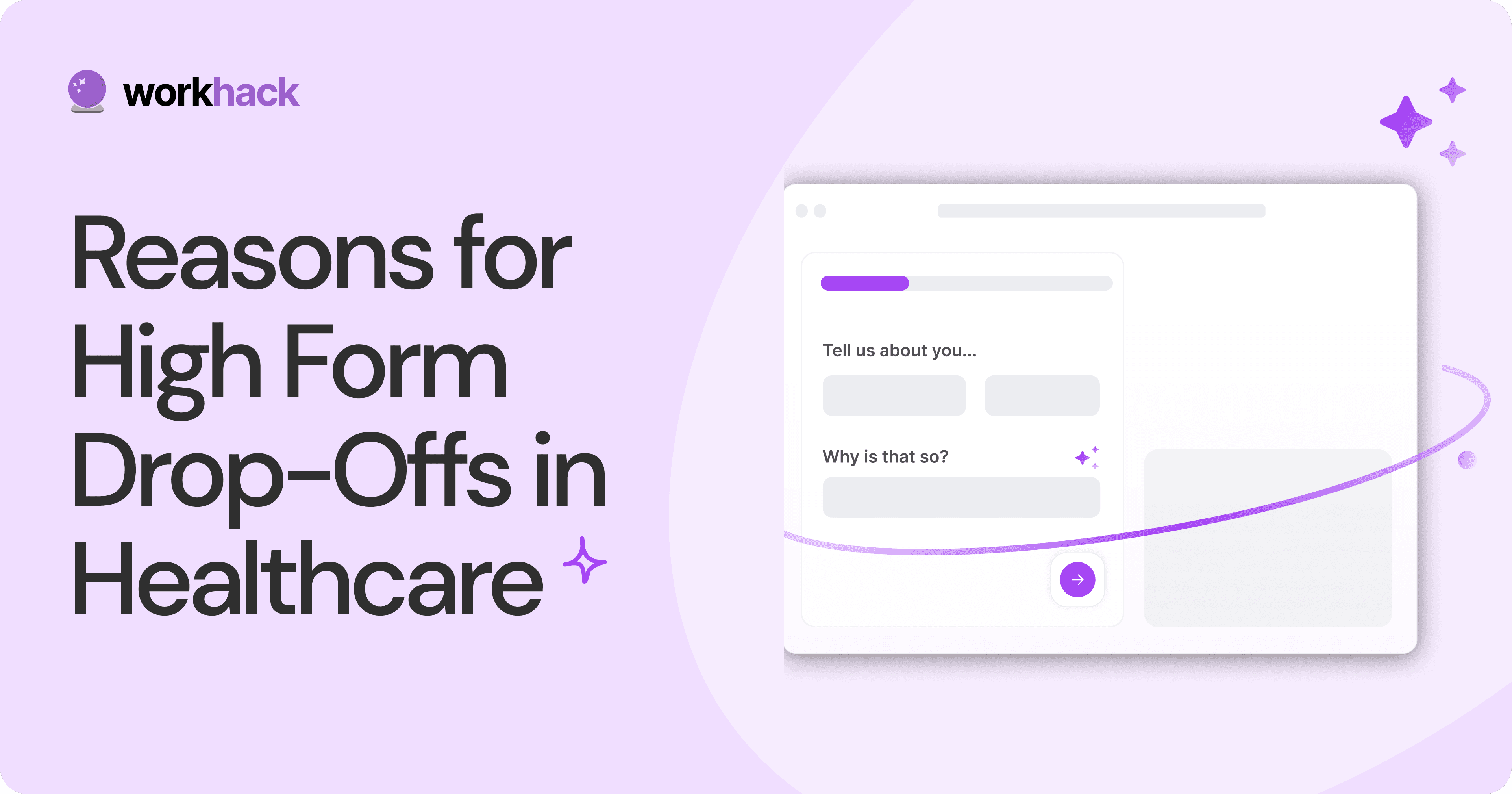
3 Reasons for Major Drop-Offs in Medical Forms.
No matter which healthcare form we pick, there are major drop-off reasons. We shall dive into the top 3 and learn how to resolve them in your next form.
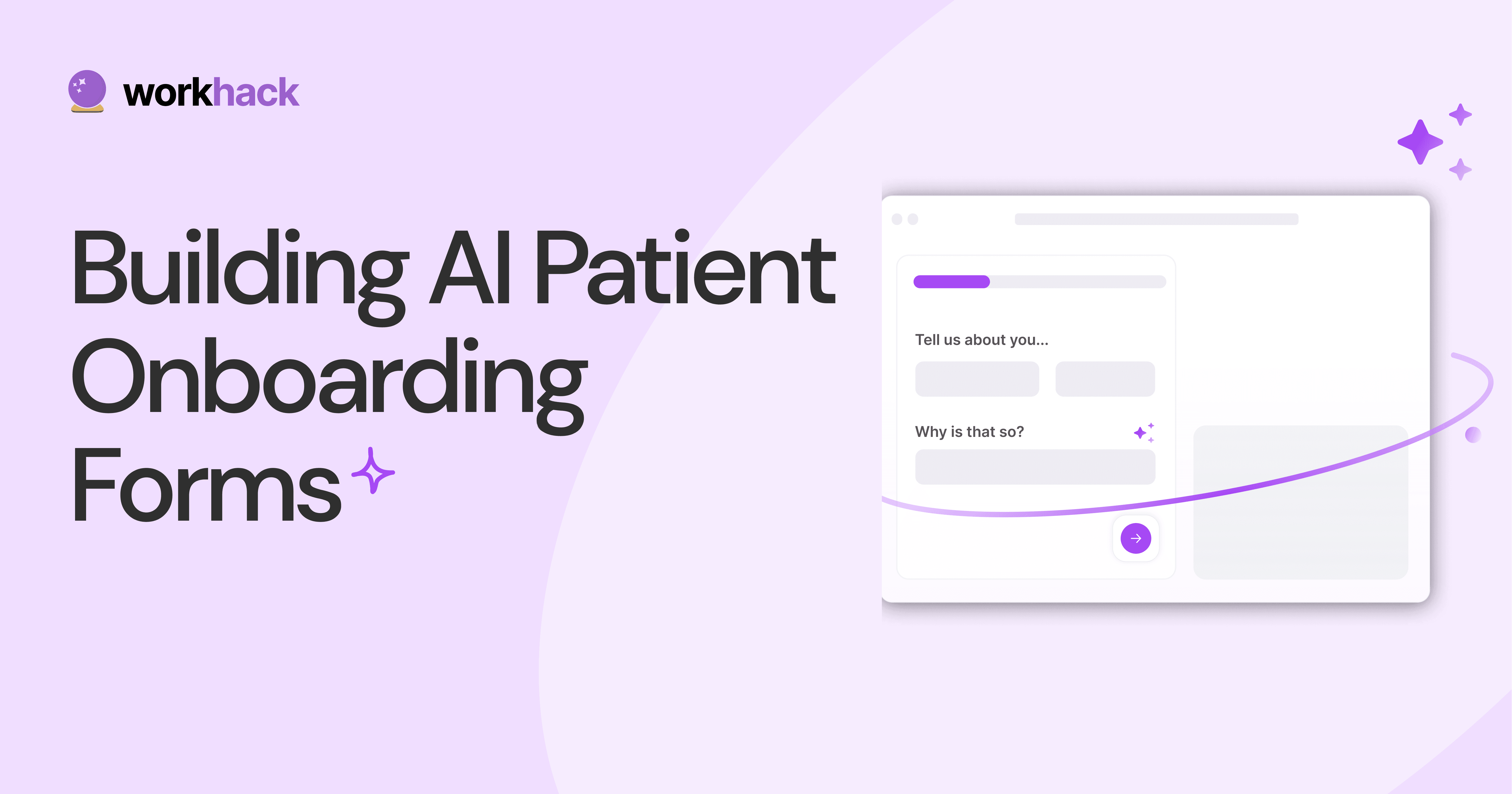
Patient Onboarding Forms - From Click to Clinic.
Patient onboarding forms are the first touchpoint for patients; getting this right for higher conversion rates is a must-have. Learn how to perfect them now.
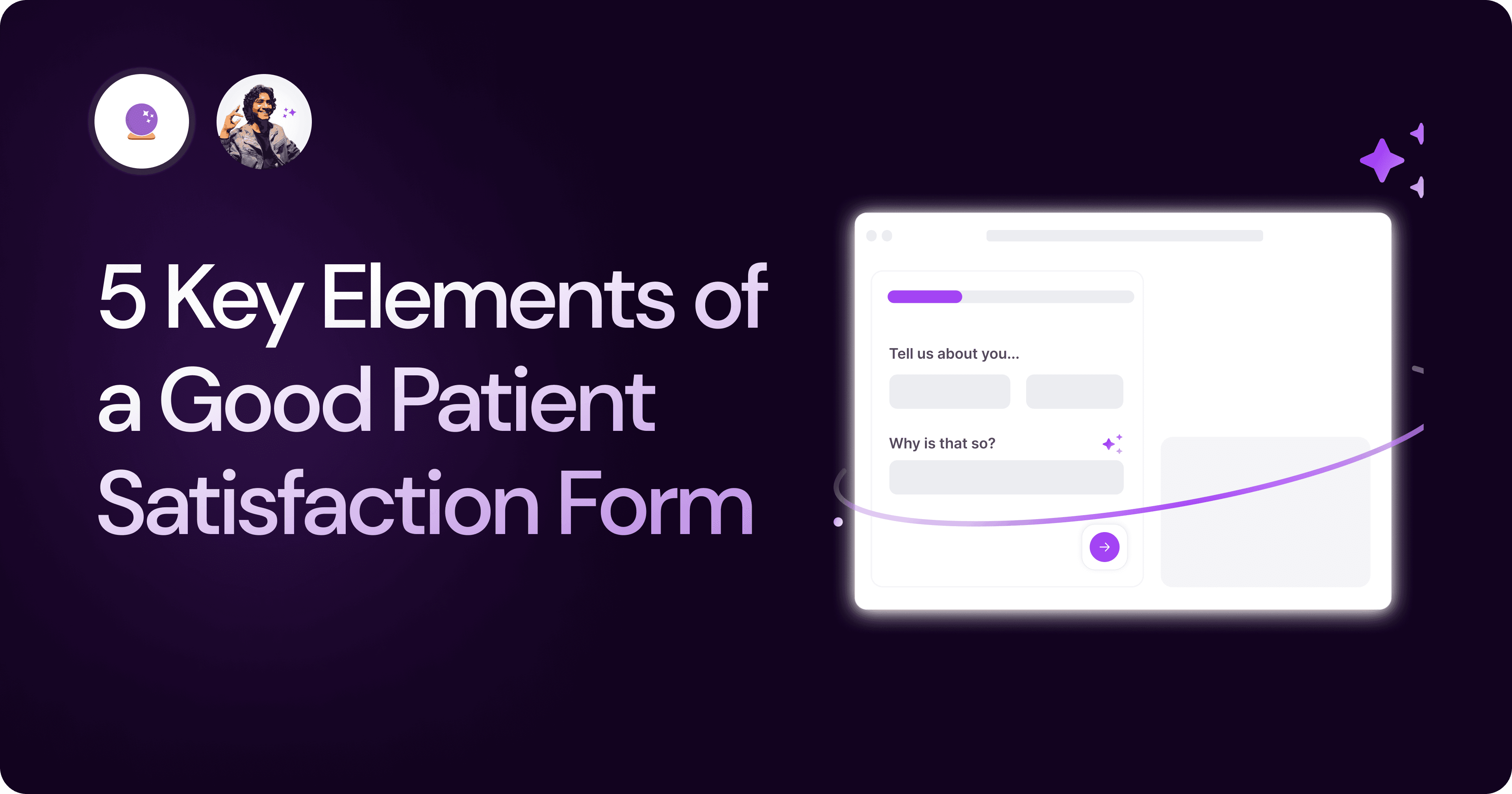
5 Key Parts of a Good Patient Satisfaction Form.
The goal of patient satisfaction surveys is to course-correct the services of a healthcare provider. Patient feedback leads to a culture of patient-centric care.
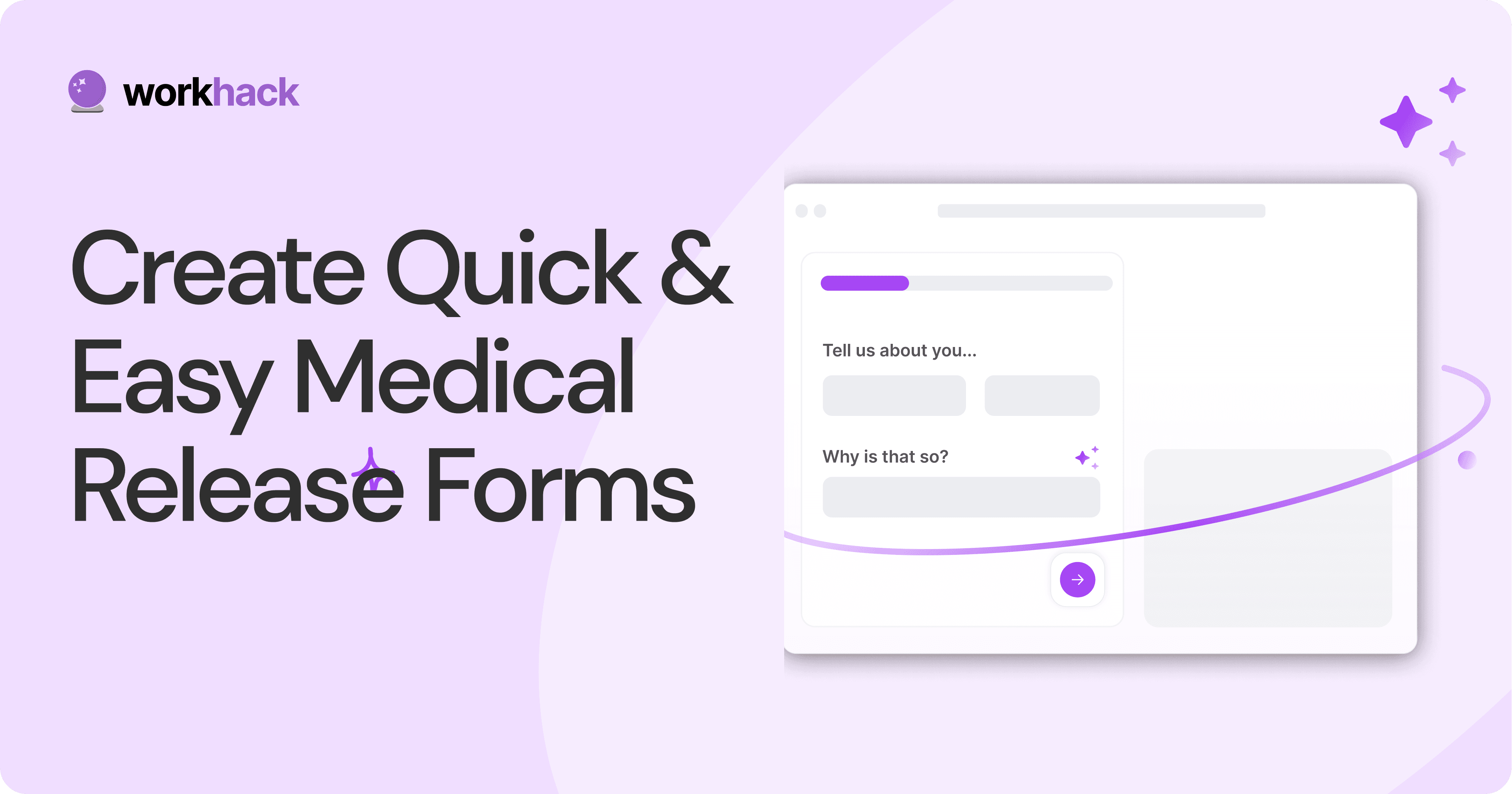
Build Quick and Easy Medical Release Forms.
Every HIPAA-compliant healthcare provider comes across medical release forms that involve details from medical history forms. Can they be shipped fast? Yes.

Nine Types of Healthcare and Medical Forms.
Medical forms are a must-have for any healthcare business or practitioner. Learn about the different kinds of medical and healthcare forms.

4 Tips for Better Medical History Forms.
Medical history forms are central to patient care, onboarding, and medical administration records. Learn how to make them easier to fill.

How to Build Mental Health Intake Forms?
Mental health intake forms are not like patient intake forms. Mental health intake forms deal with far more sensitive data and have specific design methods.

What, Why and How of Telemedicine Forms.
Telemedicine is on the rise and with different form builders out there, which one best suits your needs as a healthcare services provider?

3 Reasons for Major Drop-Offs in Medical Forms.
No matter which healthcare form we pick, there are major drop-off reasons. We shall dive into the top 3 and learn how to resolve them in your next form.

Patient Onboarding Forms - From Click to Clinic.
Patient onboarding forms are the first touchpoint for patients; getting this right for higher conversion rates is a must-have. Learn how to perfect them now.

5 Key Parts of a Good Patient Satisfaction Form.
The goal of patient satisfaction surveys is to course-correct the services of a healthcare provider. Patient feedback leads to a culture of patient-centric care.

Build Quick and Easy Medical Release Forms.
Every HIPAA-compliant healthcare provider comes across medical release forms that involve details from medical history forms. Can they be shipped fast? Yes.

Nine Types of Healthcare and Medical Forms.
Medical forms are a must-have for any healthcare business or practitioner. Learn about the different kinds of medical and healthcare forms.

4 Tips for Better Medical History Forms.
Medical history forms are central to patient care, onboarding, and medical administration records. Learn how to make them easier to fill.

How to Build Mental Health Intake Forms?
Mental health intake forms are not like patient intake forms. Mental health intake forms deal with far more sensitive data and have specific design methods.

What, Why and How of Telemedicine Forms.
Telemedicine is on the rise and with different form builders out there, which one best suits your needs as a healthcare services provider?

3 Reasons for Major Drop-Offs in Medical Forms.
No matter which healthcare form we pick, there are major drop-off reasons. We shall dive into the top 3 and learn how to resolve them in your next form.

Patient Onboarding Forms - From Click to Clinic.
Patient onboarding forms are the first touchpoint for patients; getting this right for higher conversion rates is a must-have. Learn how to perfect them now.

5 Key Parts of a Good Patient Satisfaction Form.
The goal of patient satisfaction surveys is to course-correct the services of a healthcare provider. Patient feedback leads to a culture of patient-centric care.

Build Quick and Easy Medical Release Forms.
Every HIPAA-compliant healthcare provider comes across medical release forms that involve details from medical history forms. Can they be shipped fast? Yes.

Nine Types of Healthcare and Medical Forms.
Medical forms are a must-have for any healthcare business or practitioner. Learn about the different kinds of medical and healthcare forms.

4 Tips for Better Medical History Forms.
Medical history forms are central to patient care, onboarding, and medical administration records. Learn how to make them easier to fill.

How to Build Mental Health Intake Forms?
Mental health intake forms are not like patient intake forms. Mental health intake forms deal with far more sensitive data and have specific design methods.

What, Why and How of Telemedicine Forms.
Telemedicine is on the rise and with different form builders out there, which one best suits your needs as a healthcare services provider?

3 Reasons for Major Drop-Offs in Medical Forms.
No matter which healthcare form we pick, there are major drop-off reasons. We shall dive into the top 3 and learn how to resolve them in your next form.

Patient Onboarding Forms - From Click to Clinic.
Patient onboarding forms are the first touchpoint for patients; getting this right for higher conversion rates is a must-have. Learn how to perfect them now.

5 Key Parts of a Good Patient Satisfaction Form.
The goal of patient satisfaction surveys is to course-correct the services of a healthcare provider. Patient feedback leads to a culture of patient-centric care.

Build Quick and Easy Medical Release Forms.
Every HIPAA-compliant healthcare provider comes across medical release forms that involve details from medical history forms. Can they be shipped fast? Yes.
Subscribe to stay updated.
Subscribe to stay updated.
Subscribe to stay updated.
HC

HC

HC

HC

70+ people from across industries read our emails.
HC

HC

70+ people from across industries read our emails.
HC

HC

HC

70+ people from across industries read our emails.




Bangalore, India / San Francisco, US
WorkHack Inc. 2023
Bangalore, India
San Francisco, US
WorkHack Inc. 2023
WorkHack Inc. 2023
Bangalore, India / San Francisco, US
WorkHack Inc. 2023
Bangalore, India / San Francisco, US




